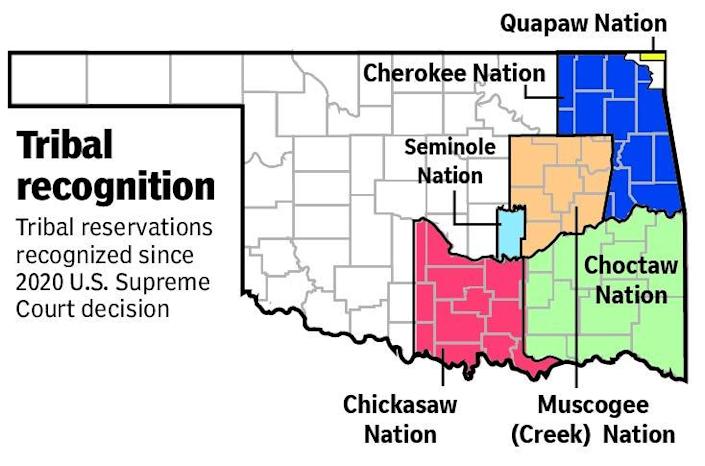The U.S. Supreme Court ruled Wednesday that Oklahoma can resume prosecuting some crimes involving Native Americans on the state’s six Indian reservations, narrowing the scope of its landmark McGirt decision as federal prosecutors struggle to keep up with caseloads.
In a 5-4 decision, the court said Oklahoma and other states share criminal jurisdiction with the federal government in Indian country when the accused is a non-Indian and the victim is an Indian.
“This Court has long held that Indian country is part of a State, not separate from it,” the high court held.
More: Amid conflicts over McGirt ruling, Cherokee Nation will stop displaying Oklahoma flag
“Under the Constitution, States have jurisdiction to prosecute crimes within their territory except when preempted by federal law or by principles of tribal self-government. The default is that States have criminal jurisdiction in Indian country unless that jurisdiction is preempted. And that jurisdiction has not been preempted here.”
The decision was a major victory for the Oklahoma attorney general’s office, which has been arguing for concurrent jurisdiction in Indian country since the high court ruled in 2020 in McGirt v. Oklahoma that the Muscogee (Creek) reservation was never disestablished.
That ruling — which was later extended to the Cherokee, Chickasaw, Choctaw, Quapaw and Seminole reservations— meant crimes committed by and against Native Americans could only be prosecuted in federal or tribal courts.
Though the state prosecuted most crimes involving Native Americans since statehood, the McGirt decision and the affirmation of the five other reservations limited district attorneys in most of eastern Oklahoma to crimes in which the defendants and victims were non-Indians.
More: FBI director warns of post-McGirt risks, asks senators for more Oklahoma funding
The Oklahoma Court of Criminal Appeals overturned several convictions of non-Indians whose crimes were committed against Indians on the reservations.
The state attorney general’s office — first under former Attorney General Mike Hunter and then under current Attorney General John O’Connor — argued that Congress never explicitly prohibited states from prosecuting crimes in Indian country with non-Indian defendants and Indian victims.
The decision on Wednesday came in the case of Victor Manuel…
Click Here to Read the Full Original Article at Yahoo News – Latest News & Headlines…

